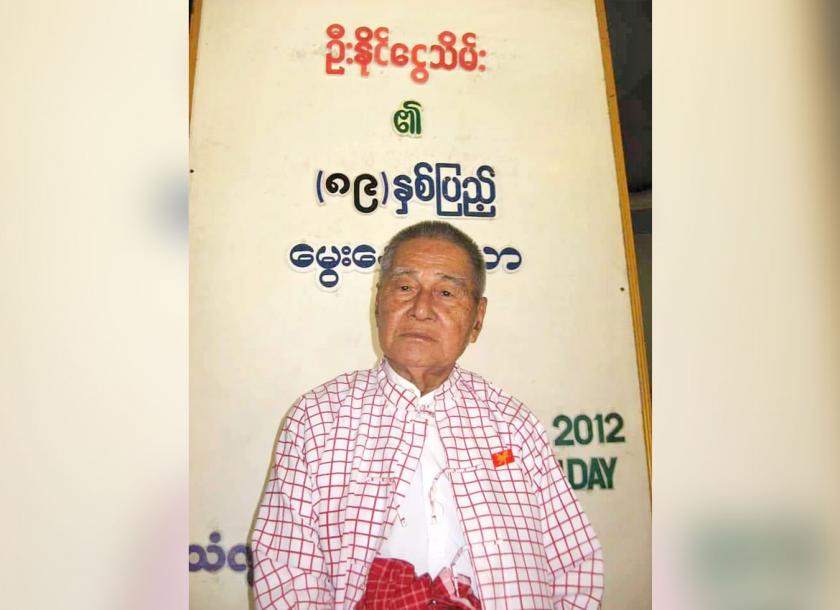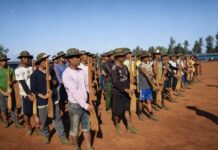On the evening of October 2 Nai Ngwe Thein, the prominent Mon national leader, passed away due to his long-term illness at the age of 96 at his home in Yankin township, Yangon Region.

He was one of the rare and well known politician in Myanmar political arena, who had come across the pre-independence period, a decade of the parliamentary era, and nearly five decades of military rule under various guise namely: Revolutionary Council (RC), Burma Socialist Programme Party (BSPP), State Law and Order Council (SLORC), State Peace and Development Council (SPDC) and the recent quasi-civilian-military government.
All along until his death, he had been serving the Mon people and as well, striving to achieve all the ethnic nationalities’ aspirations of genuine federal union.
Nai Ngwe Thein was born on 9 March 1923, to Nai Tha Dun Aung and Mi Ngwe Thong, at Htone Aie village, Hpa-an township, Karen State. At the age of 15, he was already involved in students’ boycott against the British colonial government when he was a student at Pyapone high school.
He was politically involved to further the cause of Mon people and also for the realization federalism for all the ethnic nationalities all his life. Some of the most important milestones in his political career are as follows:
- In 1942 he attended Judson College and during his entire university student life he was involved in anti-imperialist movement and at the age of 20 joined the Burma Independence Army (BIA). He also participated in Rangoon Division guerrilla unit during the Japanese resistance war.
- In 1945 he worked for All Ramanya Mon Central Organization, which is part of the Anti-Facist People’s Freedom League (AFPFL) alliance, and after the end of second world war joined the People’s Voluntary Organization (PVO).
- In 1947 he was General Secretary of Mon People’s League and in 1948 he became the central committee member of armed Mon National Defense Organization (MNDO).
- In 1959 the MNDO surrendered and joined the legal fold and in 1961 took up duty with the central committee for the realization of Mon State. Also in 1961, he participated in ethnic nationalities Taunggyi Conference as Mon representative and was a central committee member for the ethnic states unity. The Conference produced a federal amendment proposal, known as Shan Federal Proposal, which was endorsed by all the ethnic nationalities. He was detained when General Ne Win launched the military coup in 1962.
- In 1989 he was one of the founder of Mon National Democratic Front (MNDF) and was Vice-Chairman of the party. He also was one of the permanent patron member of the United Nationalities League for Democracy (UNLD). He was also a member of the patron in United Nationalities Alliance (UNA), which was made up of 12 Ethnic Political Parties (EPPs).
- In 2005 after his release from the detention he became member of the 23 political elders group that often voiced their opinions in political matters.
- In 2012 the MNDF re-registered as a political party and renamed Mon National Party (MNP) in 2014, where he was elected as Chairman.
He was in prison as political prisoner four times during his lifetime. The first was in 1948 in Moulmein, the second in 1962 when the military coup took place by General Ne Win, the third in 1990, and the fourth in 1998. All arrest had been either link to the struggle for Mon national cause or being vocal in promoting the equal rights of the ethnic nationalities through the establishment of an acceptable federal union.
Two issues
In his lifetime he seemed to be disappointed with two major issues. One is the case that he himself was involved as an architect when he surrendered to U Nu government in exchange for a Mon State. He reasoned, while eventual Mon State establishment was realized, the actual component of equal rights and rights of self-determination were still missing.
Responding to a question if the revolutionary aims were achieved by the Mon State establishment he said: “It is not achieved (fulfilled). Because we haven’t got it, the New Mon State Party (NMSP) comes into existence and I also have to be engaged in movements during successive eras,” according to Sai Tun Aung Lwin, who conducted the interview shortly before he died.
An another issue he was not in agreement was the NMSP signing of the Nationwide Ceasefire Agreement (NCA) early this year. This was perhaps because of what he considered to be a wrong decision and regretted the surrender he made to U Nu government in exchange for the establishment of Mon State without the accompanying meaningful political rights.
He reportedly said last month that Nai Htaw Mon-headed NMSP signing the NCA was “at this stage a surrender,” according to Sai Tun Aung Lwin.
Naing Ngwe Thein regarding the inking of NCA urged that historical lessons be carefully learned so that the Mon wouldn’t be tricked again.
Unfulfilled dreams
During the funeral rites, which was attended by ethnic leaders and the ruling National League for Democracy (NLD) party, Shan Nationalities League for Democracy’s (SNLD) spokesperson Sai Leik said that Nai Ngwe Thein fought the military rule starting from when he was 25 and died when the country is about to enter a new era.
“The federal union he fought for his entire life is still a long way off. The destination hasn’t been reached. To repay his service to the country, future generations need to continue his mission,” said Sai Leik, according to Myanmar Times’ recent report.
As such, the best way to pay homage to this Mon veteran national leader, who had also strive for all ethnic nationalities to fulfill their political aspirations, would be to put more effort for the realization of his cherished common goal of federal democratic union.











Leave a Comments